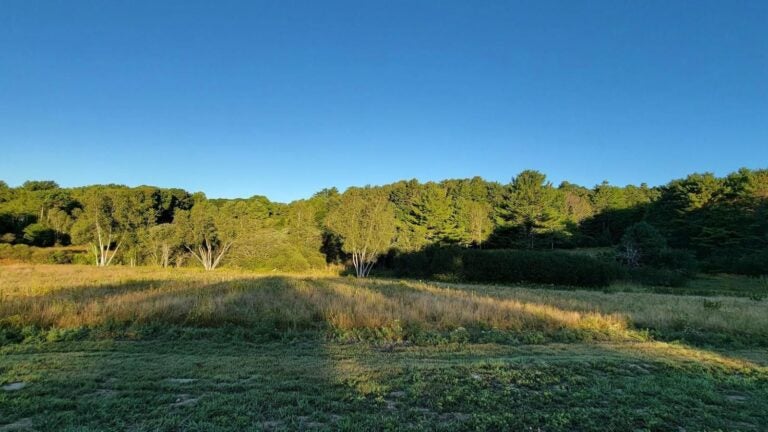Labor Day weather won’t be as nice as the rest of the long weekend
Labour Day #LabourDay

Local  A blue September sky in Harpswell, Maine, Friday morning. This is a common sight in New England this time of year.
A blue September sky in Harpswell, Maine, Friday morning. This is a common sight in New England this time of year.
September 2, 2022 | 3:59 PM
It was a chilly start to our Friday, with temperatures in the 40s in multiple locations.
You probably also noticed how blue the sky is, too. That’s an indication of the lower humidity with Canadian air in place. Labor Day weekend represents a final burst of summer for many, but in reality, we can still have warm weather right into early October and sometimes beyond.
This is day two of climatological autumn, those three months that transition between summer and winter. Meteorologically, winter begins Dec. 1.
This year, June, July, and August provided some of the driest and hottest weather we’ve ever seen. While there are summers that were hotter, the warm season provided significantly above-average temperatures — especially the entire second half. We all know that rainfall was not very plentiful, which is the opposite of last year.
 August ties the record for the most 90-degree days ever recorded in Boston. — NOAA
August ties the record for the most 90-degree days ever recorded in Boston. — NOAA
The weekend will provide some gorgeous weather with low humidity and warm temperatures on Saturday. Readings will reach at or just above 80 degrees. Humidity does creep up for Sunday, along with temperatures that will reach the mid-to-upper-80s. This is outside chance of a 90-degree reading in some towns, but I don’t think those will be widespread.
 It will be very warm Sunday, with a bit more humidity. — NOAA
It will be very warm Sunday, with a bit more humidity. — NOAA
Labor Day itself features a cold front that will stall in our vicinity. The boundary between cooler and warmer air will be close by, leaving us with clouds and showers. There are some indications it could be a washout, but even with just scattered showers, Labor Day is definitely the least favorable weather of the holiday weekend.
 — Tropical Tidbits
— Tropical Tidbits
Early next week, I expect somewhat warmer than average conditions along with lots of sunshine. It may even become very warm at times before the middle of the month.
 Much warmer than average conditions are likely the first half of September. — NOAA
Much warmer than average conditions are likely the first half of September. — NOAA
Finally, at the risk of stating the obvious, our daylight continues to shrink rapidly at nearly the fastest rate of the year. This is the final weekend where the gap between sunrise and sunset exceeds 13 hours. Over the next three weeks, we will lose nearly an hour more daylight as the nights begin to exceed the day.
 Daylight is shrinking at a rapid pace this time of year. — TimeandDate.com
Daylight is shrinking at a rapid pace this time of year. — TimeandDate.com